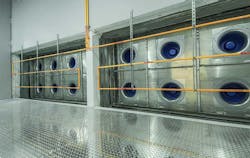For Compass Datacenters, the new direction is North.
Compass has completed the acquisition of ROOT Data Center, which owns and operates facilities in Montreal. The deal will boost Compass’ presence in hyperscale computing, providing an entry into the fast-growing market in Montreal.
The ROOT acquisition comes just days after Compass announced that it has lined up capital to deploy $3 billion of new data center capacity, with Israeli real estate firm Azrieli Group making an investment and existing investors RedBird Capital and the Ontario Teachers’ Pension Plan also adding capital. Compass now has the capacity to expand up to 375 megawatts of IT load across its campuses.
The acquisition also continues the transformation of the Montreal market, which for years was dominated by local providers. Over the last six months, three of the leading players in the Quebec market have been acquired by U.S. data center companies.
“This is an important step for us,” said Chris Crosby, CEO of Compass Datacenters. “ROOT represents our first international acquisition. Montreal is a fantastic market, and we’re believers in that market for the continued growth of hyperscale.
“The most important thing was the team and their ability to grow their plan,” Crosby said. “There’s a lot of alignment around our philosophy, and that’s the most important factor for us.”
Robust Growth in Montreal Market
ROOT Data Center has grown quickly, gaining a major hyperscale provider as an anchor tenant. The company leverages Quebec’s ample supply of cheap hydroelectric power, along with a rapid-deployment data center design.
AJ Byers, CEO of ROOT, will be joining Compass as the company’s President, International. The combined company will operate as Compass Datacenters.
“Our existing customers now have access to strategic U.S. markets, while Compass’s customers benefit from what Montreal brings,” said Byers. “In particular, Montreal’s ample fiber capacity and inexpensive supply of renewable power via Hydro-Québec enables cloud/hyperscale companies to achieve their sustainability goals while also growing at the pace necessary to meet demand.”
The Montreal data center market is being reshaped by acquisitions, which have given U.S. providers a prominent role in the region’s future. In December 2018, Vantage Data Centers acquired 4Degrees Colocation, which operates two data centers in Quebec, for $200 million. The following day, Cologix acquired COLO-D, a fast-growing wholesale data center specialist. Like the two earlier deals, the Compass purchase of ROOT is likely to bring more capital and new construction into the Montreal market.
Compass Continues to Evolve
The Compass executive team has built more than $4 billion worth of data centers and edge computing facilities, and operated over 10 million square feet of raised floor worldwide.
Compass pursues a campus strategy, enabling customers to easily expand in phases to add additional capacity as demand dictates. The company describes its designs as “Your Data Center, Your Way.” Tenants can choose from a menu of options to personalize each facility, with choices on the site, building, data hall, mechanical/electrical infrastructure, security and the building management system.
Compass is distinctive for the breadth of its platform. The company initially focused on bringing wholesale data centers to regional second-tier markets. It has also expanded into the edge computing market with the acquisition of micro-modular specialist EdgePoint and BitBox, which makes data center management software.
An illustration of the future Compass Data Center campus in Goodyear, Arizona. (Image: Compass Datacenters)
Hyperscale computing has also emerged as a key target market for Compass, which is developing large data center campuses in Northern Virginia as well as the Phoenix market. The ROOT acquisition aligns with the big opportunity in cloud data centers, adding capacity in Montreal as well as expertise in building hyperscale facilities.
“We are close to completing the first building on our northern Virginia campus and we have begun construction on our Phoenix campus to provide us with substantial capacity in the three fastest growing hyperscale markets in the U.S. and Canada,” said Crosby. “We continue to be focused on our customers’ growing demands.”
Shared Focus on Designing for Scale, Speed
ROOT was founded in 2014 and was an early adopter in bringing Kyoto Cooling into multi-tenant data center facilities. In 2015, Byers joined the ROOT team and focused on infrastructure and design for the hyperscale market.
A key selling point is ROOT’s ability to deploy capacity quickly. ROOT’s data halls are sized at 10,000 to 12,000 square feet, and supported by multiple “lineups” of 500kW of UPS and generator capacity. Cooling is provided by Kyoto Cooling units located along exterior walls of the data hall.
In the Compass design, the entire building is precast, allowing Compass to go from foundation to a completed building framework in 18 to 21 days, including the roof. Each power room is pre-fabricated and then attached to the building. Like ROOT, the cooling infrastructure employs the Kyoto Cooling heat wheel (also known as a rotary heat exchanger) attached to the rear of the building.
“The addition of ROOT’s facilities places us in a strong position for this next phase of growth,” said Crosby. “We’re very similar. Speed is a key element for both of us. We have an exceptional alignment of culture and experienced personnel, emphasizing the use of standardized components and processes to facilitate rapid data center delivery for our customers.”
About the Author



